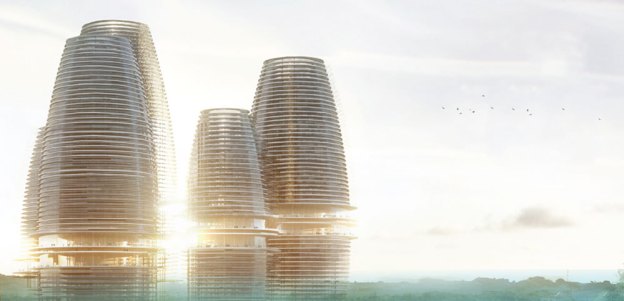
The president of Ghana has big plans for his country, and took the first steps to making them a reality earlier this week by announcing the official beginning of the Hope City project, a long-term plan to turn what is currently unused wasteland outside the country’s capital into a technologically-advanced metropolis that will lure in big businesses and manufacturing plants.
President John Mahama made the ceremonial button-push – an apparent modern-day equivalent of the initial axe swing or shovel push – to launch the project, which he hopes will see businesses from private sectors recognize the advantages in helping transform Ghana from a current lower middle income status nation to one of fully-fledged middle class. “Government has led growth since independence with all the major investments,” Mahama said during the launch. “The time has come for the private sector to take over.” The Ghanian president added that he believed the path to development in the 21st Century comes primarily from investment in services and information technology, saying that African nations no longer need to be reliant upon natural resources such as oil, cocoa, and timber for economic growth.
Already onboard is a local technology company, RLG Communications, which plans to take part in the first construction projects for the future city. The company’s head, Roland Agrambire, told local media that it is his dream “to see Hope City export technology across the globe,” adding that it is already perfectly situated to do so.

“Today Ghana sits in the middle of the world and it is much easier to export anything from this country to any part of the world,” he said. “This is the place where hope begins.”
Agrambire went on to speak about his own hopes for Hope City, saying that now “is time to dream, it is time to create history and it is time to contribute one’s quota to the development of this continent.” He hopes potential partnerships with multinational corporations will improve Ghana and Africa as a whole. “What we are also seeking to do with Hope City is collaborate with Microsoft in a new initiative to create economic opportunities for over 300 million youth across the whole of Africa between the ages of 15-24,” he said, describing information and communication technology as “the enabler of a better tomorrow” for both the country and the continent.
The unveiling of the Hope City plan – which will, when completed, house Africa’s tallest building (estimated to reach 885 feet) – follows January’s similar announcement of Kenya’s plan to build “Africa’s Silicon Savannah” to lure technology company investment over the next 20 years, with an aim to create more than 200,000 jobs by 2030. By contrast, Hope City is aiming for a more modest 50,000 jobs by 2016.


